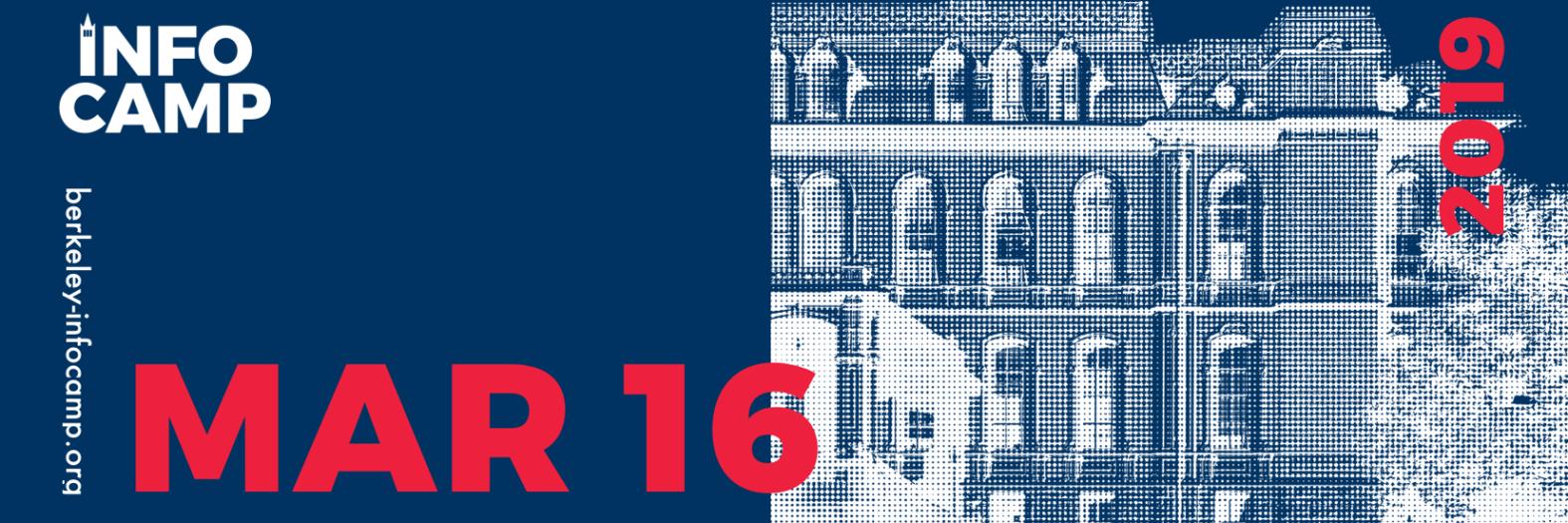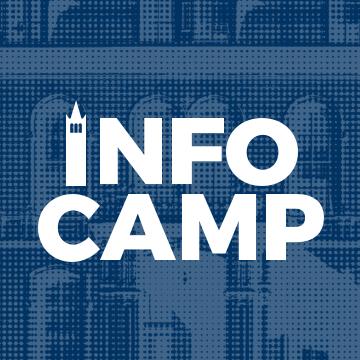InfoCamp Berkeley 2019
InfoCamp Berkeley 2019: What if?
Our world is incredibly complex thanks to the processing of information done by the atoms, organisms, ecosystems and societies that preceded us. It is our duty to preserve and enrich that complexity. We’re at a unique moment in time, where the encoding of information into bits is allowing us to abstract our reality into software, making its transformation easier than ever before and placing our information society at the center of this process.
At InfoCamp 2019, by asking “What if?”, we’ll engage in a creative dialogue with technologists, academics, students and policy-makers to explore the opportunities and challenges that our information society faces.
Schedule
|
Time |
Activity |
|---|---|
|
9:10 - 9:20 |
Intro + welcome |
|
9:20 - 9:45 |
Keynote address |
|
9:45 - 11:00 |
Panel: Understanding Users |
|
11:00 - 11:15 |
Break |
|
11:15 - 12:00 |
Unconference |
|
12:00 - 1:00 |
Panel: Building Successful Online Communities |
|
1:00 - 2:00 |
Lunch |
|
2:00 - 5:00 |
Future Scenarios Challenge Activity |
|
2:00 - 3:00 |
Talk: Tangible Interfaces |
|
3:00 - 4:00 |
Talk: The Current Bounds of Data-Driven Decisions |
|
4:00 - 5:00 |
Talk: Ethical Considerations for Scaling Companies |
5:00 - 6:30 |
Concluding remarks + mixer |
Details
Keynote address (9:20 - 9:45 am)
Krys Blackwood
Senior Lead UX designer at JPL
Morning (9:45 am - 1 pm): Panels
(Individuals and tech) - Understanding Users: Techniques and considerations
What if we could have better frameworks to understand people’s interaction with technology? What if we could rescue the value of the individual in the definition of the user? What if we could more fluidly integrate these insights into the process of technology design? By talking with researches, designers and product owners we’ll explore current approaches and emerging trends on how to better understand end users.
Panelists:
Emon Motamedi
Entrepreneur, Former Senior Product Manager at Reddit
Eric Schlakman
Product and Marketing Content at Stripe
Jessica Strick
Lead Exhibit Developer at the Exploratorium
Unconference
A loosely structured conference session emphasizing the informal exchange of information and ideas between participants, rather than following a conventionally structured panel/talk. The Information School is a place for the exchange of ideas between students, the industry, scholars, and the public. Join us at the InfoCamp - Unconference which features a community-driven format, We ask attendees to create, pitch and lead their own sessions of 10 minute duration each. To host a session, you simply choose the topic and the format and pitch your idea to the group. The schedule gets created on the fly, and you get to vote on sessions – and if yours is chosen, you pick a time slot and present.
Submitted session topics will be voted upon on the day of the conference.
Pitch Your Unconference Session
(Digital Communities) - Raising and Resolving Conflict in Online Communities
Online groups and communities are increasingly important in the ways we work, play, learn, conduct commerce, organize politically, and receive social support. These communities depend on effective social engineering – understanding how people tend to act, how we want those tendencies to manifest online, and how to design rules and affordances to 'tilt' human behavior in the directions somebody wants. What should conflict look like in online communities? In this panel we'll explore different perspectives on the escalation and de-escalation of conflict, such as centralized vs. decentralized processes, from communities including Wikipedia and Blockchain.
Panelists:
Brandon Harris
Programmer at Wikipedia
Sonya Mann
Communications Manager at ZCash
Afternoon (2 pm - 5 pm): Talks
(UX/HCI) - Tangible Interfaces
What if our interfaces transcended our screens? What if we could leverage the full potential of our senses to interact with technology? We’ll explore how new perspectives in interface design are redefining our relationship with information through embodied cognition, ubiquitous computing, and the art of research by design.
Panelists:
Dr. Tico Ballagas
Senior Manager of the Immersive Experiences Lab at HP Labs
Noura Howell
PhD candidate at the School of Information at UC Berkeley
(Product & Data) - Chronicles from the Frontier: The current bounds of data-driven decisions
Panelists
Michelle Carney
Data Science + UX at Amazon Music
Anand Rajagopal
Data Scientist at Autodesk
Luca Consentino
Product and growth at Oasis Labs
What if learning is not all about data? What if we find hard limits on the problems machines can learn by simply looking at examples? What if there are none such limits? What if our current limitations in computing power can be overcome by better algorithms or models? What if we find ways to capture more data without compromising privacy? We’ll venture into these questions with practitioners that are stretching, to its limits, the current capabilities of our data-driven machine learning paradigm; explore their approaches and evaluate opportunities.
(Strategy & Policy) - Ethical Considerations for Scaling Companies
Panelists
Dr. Chirantan Chatterjee
Fellow at Hoover Institution, Stanford
What does it mean for an information organization to scale ethically? What if the companies, governments and other organizations that transform information in our society reach a consensus around fairness, privacy and transparency? What if products are introduced into different societies, taking into account their cultural context? We’ll explore how the ethics of technological product development are being defined by the large organizations that shape our everyday lives.
Lunch (1 pm - 2 pm)
Future Scenarios Challenge (2 pm - 5 pm)
Many of us are interested in looking forward towards future challenges and opportunities (near, medium, and occasionally long term) of the information economy and society. But technology prognostication has a terrible track-record. And keying on worst-case and best-case possibilities is an unrealistic, inefficient, and sometimes dangerous way to generate insight. Scenario thinking is an alternate methodology.
In the afternoon, join other attendees from all areas in information technology for an all-hands-on-deck creative experience as we venture into more extreme scenarios of what our future could hold.
What if we end up living in a world where the Internet is highly fractured? What if we develop quantum computers but the access to this technology is unevenly distributed? What if machines become extremely precise at predicting everything from natural disasters, to economic crisis and even our own death? What if we’re able to create a safety net that detects anomalies and intrusions and “patches” our organizations, systems and economies without humans in the loop?
In connection with the CLTC, we’ve designed a role-playing challenge in which you will develop features and build strategies for different products and organizations to help them navigate these (dystopian?) scenarios.











